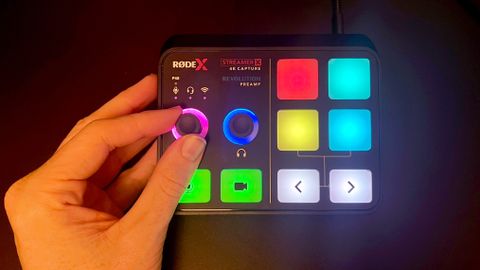RODE might be a household name with decades of experience in the audio industry, but the new RODE Streamer X marks their first step into the world of video. This combined audio interface and HDMI capture card promises to bring together a streamer’s two main inputs into one tidy package.
At £349/$399 it’s far from an entry-level solution. Although, with the price of capture cards being what they are today and audio interfaces being equally as expensive, killing two birds with one stone may appeal to more experienced content gurus. Chances are a streamer needing an XLR input isn’t an entry-level creator anyway.
So will this two-in-one unit set a new standard for the best capture cards or is RODE better off sticking to what it knows best?
Design & Features

As the latest addition to the RODE X lineup - the Australian brand’s ‘streaming and gaming division’ launched in late 2022 - the Streamer X arrives in strikingly red packaging that goes against RODE’s usual pared-back aesthetic. What’s in the box though is a return to normal service as everything about the Streamer X design is distinctly RODE.
There are plenty of elements borrowed from other RODE devices here and they come together to form a unit that feels new and familiar at the same time. The two dials and four SMART pads are lifted straight from the excellent RODEcaster Duo and all carry the impressively high build quality you expect from RODE. The back of the Streamer X is littered with IO, including a combo XLR jack, HDMI in and passthrough ports, and dual USB-C outputs. Despite so much going on, the RODE Streamer X maintains a desk-friendly compact footprint and even at just 14cm x 12cm, nothing feels cramped.

Each input across the top is backed by customisable RGB lighting and while these are bright and saturated, they’re also the source of one of the Streamer X’s main annoyances. If you use the included external power source - they don’t turn off, ever. Powering the device via USB alone does see them turn off with my PC, but with no physical or digital on/off switch I was forced to yank out the power cable each time I was done. It’s harmless, it’s just bizarre and could do with fixing in a firmware update.
At 380g the RODE Streamer X is far from heavy but it is hefty enough to sit flat with cables connected, something external capture cards like the AverMedia Live Gamer Extreme 3 often struggle with. Even testing with the most rigid HDMI cable I could find I was impressed with how stable the Streamer X remained. Its rubberized feet meant it stayed put while twisting the volume dials too.
Performance

Half audio interface, half external capture card, the RODE Streamer X tries to do two things at once and while it does them pretty neatly overall it’s not without a few shortcomings.
Unsurprisingly, given it’s their bread and butter, as an audio interface the RODE Streamer X does wonderfully well. I swapped it into my streaming setup and connected a RODE PodMic via XLR and was up and running with great audio performance out of the box. There’s the same studio-quality VoxLab and APHEX processing onboard as you’ll find in other RODE devices like the RODEcaster Pro 2, though unlike those units you’ll need the UNIFY desktop app to take control of them with the Streamer X.
The tools within the app are simple to use and it’s worth spending some time playing with each setting as there are genuine improvements to be made when it comes to vocal performance. UNIFY is also where you unlock the full potential of the four SMART pads which can be configured to trigger sounds, toggle voice effects or even linked to MIDI commands which essentially turn the Streamer X into an ElgatoStream Deck for controlling applications - very handy for streamers. There’s no scope to re-bind the two dials however, these are locked to controlling mic gain and headphone levels. I’d have liked to have seen the ability to change HDMI audio gain here. Trying to balance the Mario Kart menu music is a battle that could have been easily won. Thank goodness for the BEACN Mix Create.
When it came to video, the experience was good without being overly impressive. There are definitely limitations to what the Streamer X is capable of. Connected via USB-C it’ll capture a range of resolutions up to 4K30 though there’s no HDMI 2.1 so high frame rates aren’t supported at anything more than 1080p. HDR is available up to 4K60 in passthrough, but only up to 1080p when it comes to capturing. It’s all just a bit dialed back and lags behind some other external options in the market like the Elgato Game Capture HD60 X.

That said, it’s a jack of all trades, acting as an audio interface too and when you play within its boundaries the RODE Streamer X is capable of doing a fine job as a capture card. Diving into Shadow of the Tomb Raider on an Xbox Series X I was impressed with the detail and colour of the jungle landscapes, even without HDR, while the fast movement of F1 23 was also well handled with no noticeable tearing or visual artefacts. Unsurprisingly it handled the feed from my Nintendo Switch with ease too and while it’s capable of more, it feels at home at that level rather than trying to push the limits with one of the best gaming PCs.
Playing on my LG OLED CX via passthrough the experience was no different to if the console was directly connected. The picture retained the same quality - with full resolution and HDR - and inputs felt immediate. I did notice the slightest touch of input latency when trying to play via the OBS preview, and while this wasn’t impactful to my level of gameplay competitive players will likely want to use passthrough.
I’m pleased to see the dual USB-C outputs carry over from the RODEcaster series and this is an area RODE has a leg up on the competition. How useful this is, in reality, will vary from setup to setup, but it’s a nice inclusion that brings easy flexibility for dual-PC streamers. There’s only 1 USB-C cable included in the box however and just like some of the best webcams these days, I found the Streamer X was picky about which USB-C cable it was happy to work with, so you’ll need to invest in a quality wire that supports the SuperSpeed transfer standard.
Should you buy the RODE Streamer X
The Streamer X is a solid first step into the world of video for RODE and the start of a product line I can see being refined in future. On its own, the capture card might not be the strongest in the market, but it does capture decent video and when combined with the best bits from RODE’s extensive audio range like studio-grade APHEX processing and versatile SMART pads it creates a very compelling device for streamers.
£349/$399 may feel steep as a single purchase, but it falls in line with the total bill for a quality audio interface and mid-range external capture card so isn’t unreasonable in the long run. For dual-PC streamers or those focusing more on 1080p gaming the RODE Streamer X is a strong choice.
How we tested the RODE Streamer X
I used the RODE Streamer X for both local recording and live streaming and tested it with both a Windows desktop gaming PC and a Macbook Air. For audio, I paired it with a RODE PodMic USB and connected it via HDMI to both an Xbox Series X and a Nintendo Switch.
For more testing methodology, check out our Hardware Policy.
Looking to polish other parts of your content creation setup? Look at the best mics for streaming and gaming, the best ring lights, and the best green screens.


